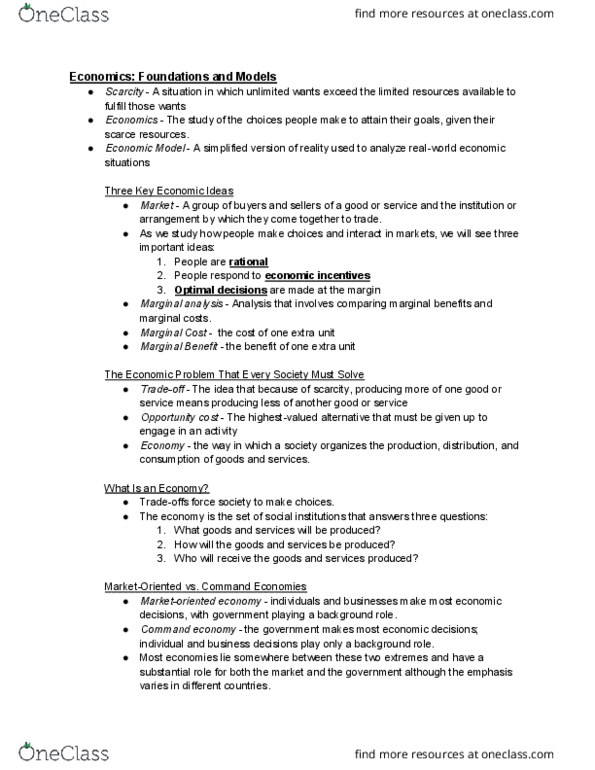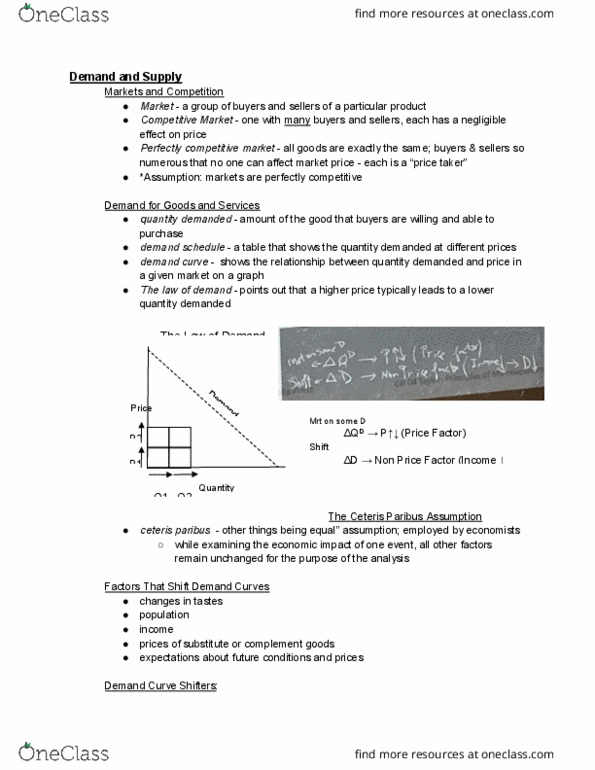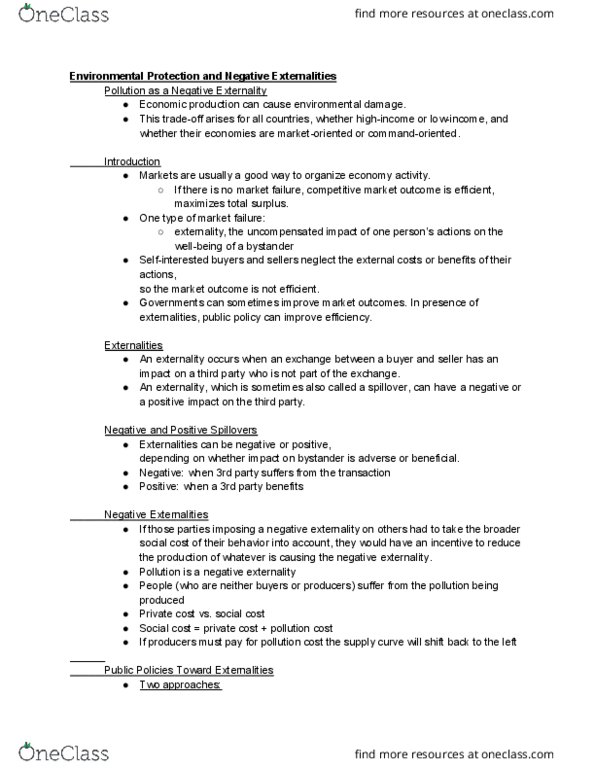ECON 13 Lecture Notes - Lecture 11: Externality, Cost, Social Cost
Document Summary
Get access


Related Documents
Related Questions
Question 1
Which compensation method helps to explain the large difference between the salaries of top-level managers and mid-level managers in a firm?
| A. | Tournaments | |
| B. | New blood | |
| C. | Piece rate | |
| D. | Backloaded compensation |
3 points
Question 2
Please consider the information provided under Question 19 in Chapter 3 (page 54). Based on the stated information, the optimal number of bees kept if the externality is ignored by Yung is 5,000. Is the socially optimal number of bees higher or lower than 5,000?
| A. | We do not have enough information to answer this question | |
| B. | Same | |
| C. | Lower | |
| D. | Higher |
3 points
Question 3
Which of the following factors contribute to the existence of firms?
| A. | All of these factors contribute to firm existence | |
| B. | Risks associated with specialization | |
| C. | Incomplete contracts | |
| D. | Willingness of some people to take on risk in exchange for residual income |
3 points
Question 4
Public goods are often subject to free-rider problems because these goods are:
| A. | Non-rival and non-excludable | |
| B. | Rival and non-excludable | |
| C. | Non-rival and excludable | |
| D. | Rival and excludable |
3 points
Question 5
Which of the following is the most efficient mechanism for allocating scarce goods?
| A. | Government allocation system | |
| B. | First-come-first-served system | |
| C. | Market system | |
| D. | Random allocation system |
3 points
Question 6
Many years ago, most of the major Hollywood movie studios also owned chains of local movie theaters across the US. Today, most of the local movie theaters are owned by other companies. What has happened to the degree of integration in the movie industry over time?
| A. | Less horizontally integrated | |
| B. | Less vertically integrated | |
| C. | More horizontally integrated | |
| D. | More vertically integrated |
3 points
Question 7
Your firm produces replacement parts for the nuclear submarines operated by the US Navy. Which one of Porter's Five Forces will be most prominent in determining your strategies and profitability?
| A. | Bargaining Power of Suppliers | |
| B. | Bargaining Power of Customers | |
| C. | Threat of New Entrants | |
| D. | Threat of Substitutes |
3 points
Question 8
Which of the following statements is NOT true?
| A. | The market mechanism for allocating resources is most efficient due to the incentives it creates. | |
| B. | Markets are always the most efficient way to allocate goods, even if the market is not perfectly competitive. | |
| C. | The random allocation mechanism provides no incentives at all. | |
| D. | The government allocation mechanism provides no incentive for the economy to grow. |
3 points
Question 9
Suppose a firm's cost structure exhibits economies of scope. Which of the following actions is compatible with this cost structure?
| A. | Diversify into other product lines | ||||||||||||||||||||||||||||||||||||||||||||||||||||||||||||||||||||||||||||||||||||||||||||||||||||||||||||||||
| B. | Focus on core competencies and reduce production | ||||||||||||||||||||||||||||||||||||||||||||||||||||||||||||||||||||||||||||||||||||||||||||||||||||||||||||||||
| C. | Focus on core competencies and maintain constant production | ||||||||||||||||||||||||||||||||||||||||||||||||||||||||||||||||||||||||||||||||||||||||||||||||||||||||||||||||
| D. | Focus on core competencies and expand production Question 10 Please refer to Table 8.3 on page 132 in the book. Suppose we change the payoffs in the "low price, low price" cell to 0, 25 from 0, 0. Does this change the Nash equilibrium for the game, and is the game still a Prisoner's Dilemma?
3 points Question 11 Which of the following statements about restricting entry to markets is NOT true?
3 points Question 12 Your firm earns $2 million per quarter in total revenue, and your accounting profits are $100,000 per quarter. You do not charge the firm for the use of an old building that you own because it is 50 years old and fully depreciated. However, another firm has offered you $200,000 per quarter to use the facility, and this is the market rental rate for similar facilities. In this case, we know that your:
3 points Question 13 Please refer to Question 13 in Chapter 1 (page 17). What is the marginal cost of reducing global warming by 0.017 degrees?
3 points Question 14 In Chapter 6, Boyes focuses on negative externalities such as the various types of pollution. However, as we discussed during our online session, we can also observe positive externalities in which external benefits are generated for people. Which of the following is NOT an example of a positive externality?
3 points Question 15 Common property resources are:
3 points Question 16 The free-rider problem arises in markets for common property resources.
3 points Question 17 Firms that set their product price below the actual cost of production may be engaging in:
3 points Question 18 Under a cap-and-trade mechanism to control air pollution, what happens to the price of pollution rights if the supply of righs is reduced (i.e., the supply of rights is reduced)?
|



